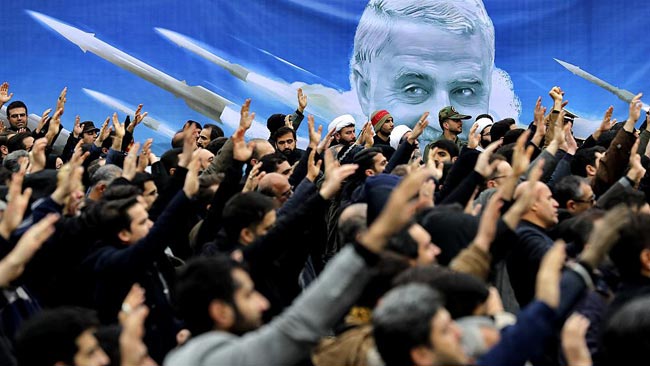Iran pulls out of nuclear deal amid rising tensions in Mideast
January 7, 2020 11:53 am
The consequences of the American killing of a top Iranian general rippled across the Middle East and beyond on Sunday, with Iran all but abandoning a landmark nuclear agreement and Iraqi lawmakers voting to expel American forces from their country.
Steeling for retaliation from Iran, an American-led coalition in Iraq and Syria suspended the campaign it has waged against the Islamic State for years, as hundreds of thousands of Iranians took to the street to mourn the general, Qassim Suleimani.
“Iran’s nuclear program will have no limitations in production, including enrichment capacity,” the Iranian government said in an announcement Sunday that seemed to signal the de facto collapse of the 2015 agreement.
Warning Iran not to attack, President Trump said the United States had pinpointed 52 targets in Iran — including cultural sites. The sites, he said, represented the 52 American hostages held at the United States Embassy in Tehran during the Islamic Revolution in 1979.
Amid outrage in Iran, Foreign Minister Mohammad Javad Zarif declared that “targeting cultural sites is a war crime” and predicted that the “end of U.S. malign presence in West Asia has begun.”
Mr. Trump also directed his anger at Iraq, warning it not expel American forces, and pointing to an air base the United States built there. “We’re not leaving unless they pay us back for it,” he said.
Mr. Trump has said that the killing of General Suleimani on Friday was aimed at preventing war.
But so far, it has unleashed a host of unanticipated consequences that could dramatically alter where the United States operates. Increasingly, the killing appeared to be generating effects far beyond the United States’ ability to control.
That may include Iran’s nuclear future.
On Sunday, the Iranian government said it was abandoning its “final limitations in the nuclear deal,” the international agreement intended to prevent Tehran from developing nuclear weapons. The decision leaves no restrictions on Iran’s nuclear program, the statement said, including on uranium enrichment, production, research and expansion.
Iran will, however, continue its cooperation with the International Atomic Energy Agency and return to the nuclear limits if the economic sanctions imposed on it are removed and Iran’s interests guaranteed, the government said. American sanctions have hit Iran’s oil-based economy particularly hard.
General Suleimani was a towering figure both in Iran and across the Middle East, where he cultivated proxy militias in Iraq, Syria and Lebanon. Since he was killed in an American drone strike at the Baghdad airport on Friday alongside a powerful Iraqi militia leader, Iran and its partners have stepped up calls for vengeance, although they have yet to follow through on the threats.
American allies have largely kept quiet and distanced themselves from the killing so as not to put themselves in the line of fire.
Lawmakers in Iraq voted on Sunday to require the government to end the presence of American troops in the country after Mr. Trump ordered the killing on Iraqi soil.
The vote will not be final until it is signed by the prime minister, and it was unclear whether Iraq’s current caretaker government had the authority to end the relationship with the United States military.
Few doubted, however, that the country would take whatever legal actions were necessary to compel a United States departure over the coming months. Prime Minister Adel Abdul Mahdi drafted the language and submitted the bill approved by Parliament on Sunday, leaving little doubt about his support.
Mr. Trump warned Iraq on Sunday that there would be dire consequences for expelling American forces.
“We have a very extraordinarily expensive air base that’s there,” he said. “It cost billions of dollars to build, long before my time.”
“If they do ask us to leave,” he added, “if we don’t do it in a very friendly basis, we will charge them sanctions like they’ve never seen before ever. It’ll make Iranian sanctions look somewhat tame.”
Although the vote in Parliament was 170-0, lawmakers were more divided on the issue of ousting American troops than that tally may suggest.
Many of the 328 members of Parliament, primarily those representing the country’s ethnic Kurdish and Sunni Muslim minorities, did not attend the session and did not vote. Iraq’s Shiite Muslim majority dominates the Iraqi government.
While groups that grew out of Shiite militia organizations have pushed hard for the expulsion, Sunni Muslim factions and the Kurds have wanted the United States to stay.
The legislation threads a fine needle: While using strong language demanding that the government “end any foreign presence on Iraqi soil and prevent the use of Iraqi airspace, soil and water for any reason” by foreign forces, it gives no timetable for doing so.
It would end the mission approved in 2014 that gave the United States the task of helping Iraqi forces fight the Islamic State. That agreement gave the Americans substantial latitude to launch attacks and use Iraqi airspace.
But the measure would leave in place the Strategic Framework Agreement, which allows an American troop presence in Iraq in some form, although only “at the invitation of the Iraqi government.”
On Sunday, the American-led coalition in Iraq and Syria said it would pause its yearslong mission of fighting the Islamic State and training local forces in both countries.
A pullout of the estimated 5,200 American troops in Iraq could cripple the fight against the Islamic State, or ISIS, possibly facilitating its resurgence. A smaller contingent of about 1,000 United States troops are in eastern Syria.
The general’s killing unleashed calls for vengeance in both Iraq and Iran, and reinforced solidarity among hard-liners and moderates in Iran against the United States. After the vote in Iraq calling on the government to expel American troops, Iranian officials reacted with congratulatory messages.
Hesameddin Ashena, a top adviser to President Hassan Rouhani, wrote on Twitter, “Expanding friendship with our neighbors and domestic unity are the best gifts for protecting our national security.”
In Iraq, the attack was seen as a violation of the nation’s sovereignty. On Sunday, Iraq’s Foreign Ministry said it had summoned the American ambassador in Baghdad.
In Iran, it was viewed as tantamount to an act of war. Hossein Dehghan, a military adviser to Ayatollah Ali Khamenei, told CNN that Iran’s response would include an attack on “U.S. military targets.”
Source: NYT
-Agencies












